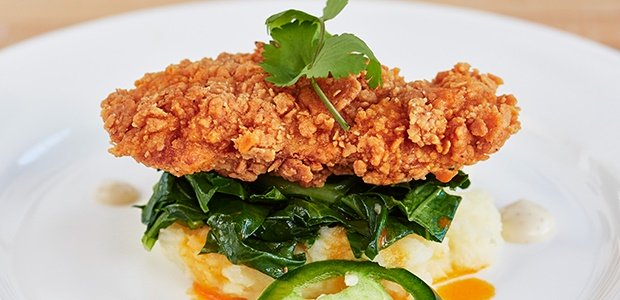(image: Memphis Meats media and PR)
We are currently in an ever-changing and ever-exciting time for the future of meat, with innovations becoming a necessity that go beyond personal ethical vendettas.
If you’re unaware, the meat industry is, according to Virgin.com, the largest source of carbon emissions compared to the other big one, transportation. Which means that every steak you eat, every burger you devour, has a greater cost involved, which means we need to stop thinking about our food intake on a micro level, and start being aware of the broader impact that a continued meaty diet has on the planet. Not only that, but also the quality of the meat we’re eating and its provenance.
ALSO READ: Why you should know where your meat comes from
If we are worried about a water crisis or about plastic pollution, then we too should be concerned about excessive meat eating. Virgin.com also states that Richard Branson and Bill Gates have backed this movement by investing in a revolutionary business called Memphis Meats, who are manufacturing real meat without killing any animals.
(image: iStock)
The idea sounds impossible at first, but thanks to a fine-tuned scientific process and state of the art technology, stem cells are extracted from an animal, and then developed into meat in a lab.
The business has caught the support of some big names. Other than Branson and Gates, Cargill, one of the US’s major meat producers has grabbed a stake of Memphis Meats as well, along with former McDonald’s CEO, Don Thompson joining the board of advisors. The high level of endorsement is enough to legitimise Memphis’s operation, proving that the future of meat eating could very well see a seemingly idealistic construct becoming a reality.
How it works
Situated in the tech capital of the world, Silicon Valley, Memphis won’t be feeding or breeding animals. That is the first compelling achievement in their business model. Anyone who’s seen that Viceland documentary Meathooked and the End of Water, will know just how devastating the farming of cattle is to American water supply because, like humans, animals require vast amounts of it.
ALSO READ: Cooking in the midst of a drought: Top Western Cape chefs challenged to create a menu with no water
Self-renewing cells are extracted from an animal, so that these cells can produce more starter cells when fed nutrients, the same nutrients and animals need to grow. These cells are kept in a type of ‘brewery’, which will be open for public tours.
Once the cells have grown into actual meat items, they are ready to cook, and look exactly like a slice of chicken or a beef meatball. These are items currently on their product list. Memphis Meats started with the development of a meatball, and today they’ve expanded to include Southern fried chicken and Duck à L’Orange.
Memphismeats.com states that Memphis guarantee the process requires “up to 90% fewer greenhouse gas emissions, land and water than conventionally-produced meat”. Bloomberg.com reports that their revolutionary and innovative business model has allowed them to raise $22 million to further their tech-driven venture. Memphis Meats simply fits the bill for the future of business: it’s ethically sound and is driven by science.
But does it taste good? Watch the video to find out:
The meat alternative trend is growing
These guys aren’t the first and will surely not be the last to develop an alternative to meat farming and production. Impossible Foods wowed us about a year ago with their sizzling, bleeding meat-free burger patty, also coming out of Silicon Valley and also backed by Bill Gates. The burger is completely plant-based, getting its red juice from beetroot, and fooling meat eaters with its appearance and taste.
Beyond Meat is another American business that developed a meat-free, soy-free, GMO-free burger patty uncanny to the real thing. According to Buzzfeed, they sold out in an hour upon their first release at Wholefoods.
The future of clean meat
There’s no doubt that South Africa is a meating-eating nation, a country were braais and bunny chows are part of our culinary heritage. We are also a nation where meat consumption in middle income groups tends to increase with disposable income, which says a lot about the idea of consuming meat; it’s a luxury, and one that many place on a pedestal, and in doing so allow meat to be the central ingredient to any upstanding meal.
Branson, who gave up beef a few years ago, stated in his Virgin.com blog that in 30 years time, people would be solely eating clean meat and protein alternatives. 30 years sounds a bit optimistic for South Africa where sustainable eating is still on a small scale, however the US’s influence is far reaching, and we can only hope that SA will be on their tail in a bid to reduce traditional meat consumption.
Would you tuck into the Southern fried chicken from Memphis Meats seen in the video above? Lets us know in the comments section below and tell us your thoughts on alternative proteins and clean meat.
SaveSave

